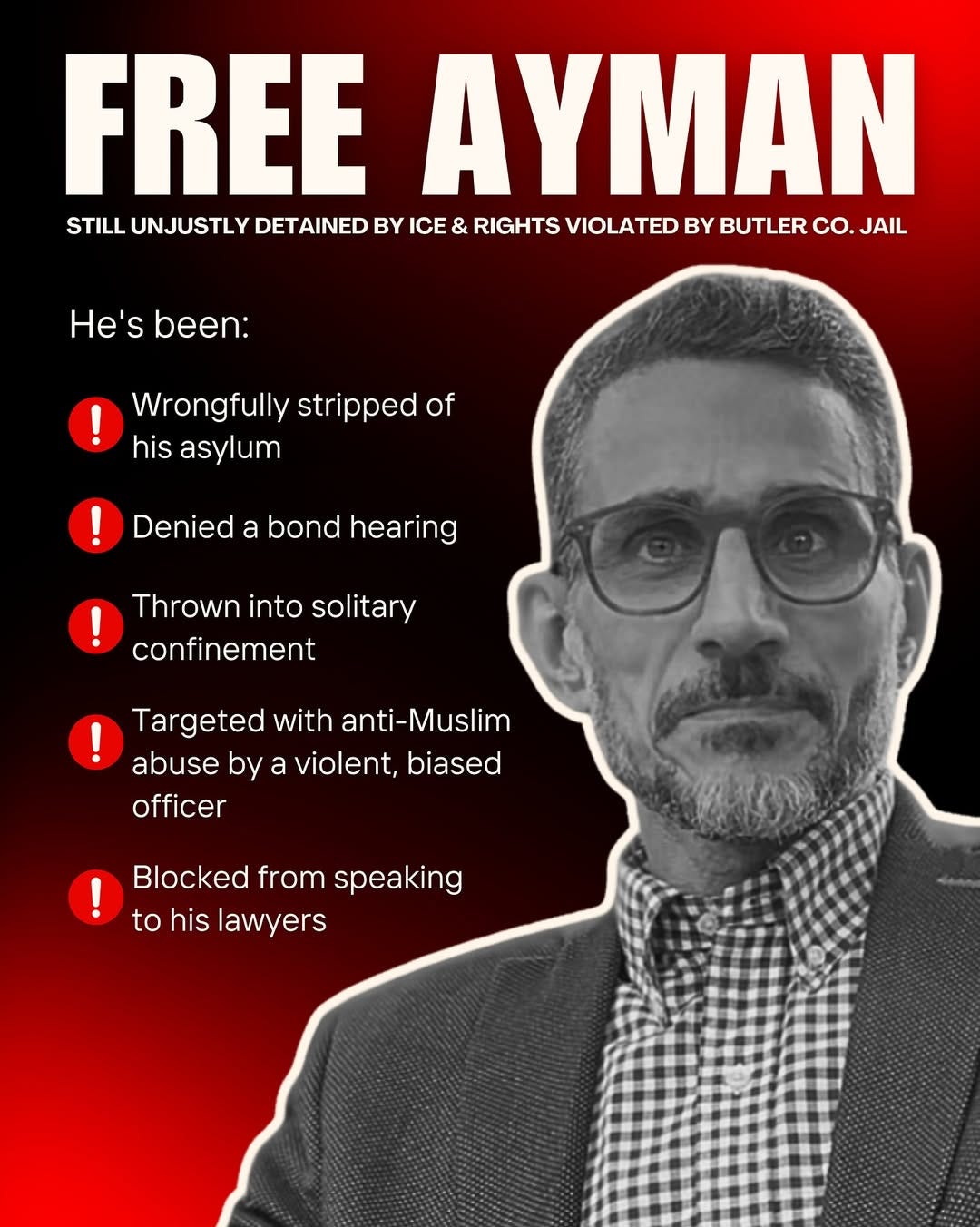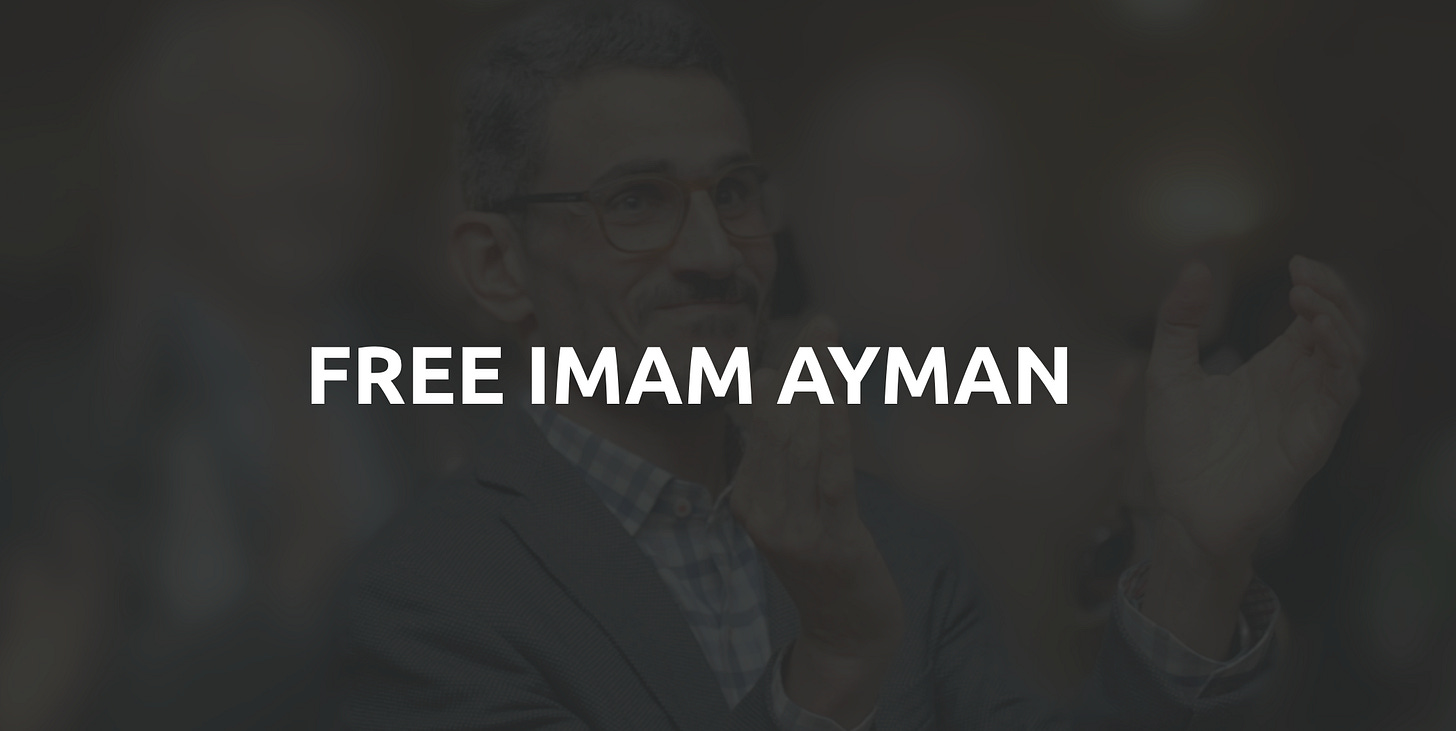Ayman Soliman's Deportation is a Death Sentence
In an Ohio courtroom, a beloved chaplain’s life hangs in the balance, exposing the cruelty and collapse of U.S. asylum protections.
In Ohio this summer, the United States is putting its commitment to democracy and human rights on trial — not in theory, but on the back of a living man. Ayman Soliman, a 51-year-old Egyptian-born chaplain, former journalist, and torture survivor, has spent weeks in solitary confinement at Butler County Jail. His “offense” isn’t a crime, but the government’s move to strip away his 2018 asylum protections on shaky, discredited grounds — and start deportation proceedings to return him to the brutal regime he fled.
Immigration Judge Jennifer Riedthaler-Williams, whose record speaks volumes, is hearing the case. From 2019 to 2024, she denied 79.2% of asylum claims — far above the national average of 57.7%. In a court system already hostile to asylum seekers, that denial rate puts her firmly on the side of government skepticism toward refugee claims. For Soliman, that statistic could mean life or death.
Escape from Egypt, Service to America
Soliman’s story mirrors the kind of refugee narrative America once claimed to honor. As an independent journalist during the Arab Spring, he covered Egypt’s Tahrir Square protests, the Maspero demonstrations, and the 2013 elections. For his work, state security forces arrested and tortured him repeatedly. By 2014, certain that staying meant death, he fled to the U.S. on a legal visa and won asylum in 2018.
Here, he dedicated himself to service — first as a prison chaplain in Oregon, then as a beloved interfaith chaplain at Cincinnati Children’s Hospital. Fluent in English, Arabic, and Spanish, with two master’s degrees, he became known as the “Interfaith Imam,” comforting gravely ill children and their families of all faiths.
A Manufactured Case for Deportation
The government’s case for revoking his asylum rests on a flimsy premise: his past board membership in an Egyptian charity, Al-Jameya Al Shara’iyya. Officials claim the charity has “links” to the Muslim Brotherhood and thus “supported terrorism.” Yet neither the charity nor the Brotherhood is designated a terrorist group by the U.S., and Soliman openly disclosed the affiliation when applying for asylum.
In court, U.S. attorneys have already abandoned the terrorism claim — yet deportation efforts continue on other grounds. The arbitrary nature of the case is impossible to ignore.
Solitary Confinement: Torture by Another Name
The cruelty extends beyond the courtroom. Since July 2025, jail officials have held Soliman in solitary confinement without any legitimate security or disciplinary reason. Solitary isn’t mere isolation — it’s recognized worldwide as psychological torture. Its documented effects include:
Severe anxiety, depression, paranoia, and suicidal thoughts.
Sensory deprivation leading to hallucinations and disorientation.
Physical harm, from hypertension to heart attacks and strokes.
Long-term brain changes impairing memory and emotional control.
For a man already scarred by torture, this is retraumatization in slow motion. The UN Committee Against Torture has declared that prolonged solitary confinement is “cruel, inhuman, and degrading.”
What Deportation Would Mean
If deported, Soliman would likely be arrested upon arrival in Cairo, “disappeared” for weeks or months, and tortured — a fate well-documented for political dissidents in Egypt. Under Abdel Fattah al-Sisi, Egypt holds tens of thousands of political prisoners, routinely uses beatings and electric shocks, and conducts sham trials leading to execution. In 2024 alone, at least 50 prisoners died behind bars; dozens more perished in early 2025. For Soliman, deportation is a death sentence in all but name.
A Community and a Principle Under Threat
Congressman Greg Landsman, Ohio Democrats, faith leaders, and hundreds of community members have rallied to his defense, calling the deportation effort a moral outrage. The stakes go beyond one man. If the U.S. can revoke asylum years later on dubious grounds, every refugee lives at the mercy of political whims. The message to the world is unmistakable: American refuge is conditional, revocable, and unreliable.
The Verdict on America
Soliman’s case sits at the intersection of immigration law’s cold machinery and the authoritarian logic it should oppose. Locking him in solitary confinement rehearses the same repression he fled. Sending him back would make the U.S. complicit in torture and death. For a nation that once prided itself as a sanctuary for the persecuted, there could be no louder renunciation of its own ideals.
America’s choice is stark: defend Ayman Soliman’s life — and the principle that democracy offers refuge — or become complicit in his destruction
Call to Action
Your voice can save his life— here’s how you can act now to help save Ayman Soliman:
Sign the petition to free him from ICE detainment:
MLFA is defending him pro bono, but they need your support to keep fighting for his release and protect others like him:
Or learn how to help in these ways from the Free Imam Ayman website:
Call your members of Congress
Donate to his legal fund
Urge Cincinnati Children’s Hospital to speak out
Write or call to raise awareness
Send him a letter of support
Sign the petition and follow allied groups








